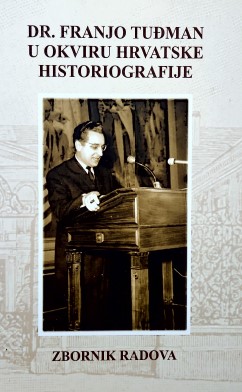DR. FRANJO TUĐMAN, JUGOSLAVENSKA/HRVATSKA AKADEMIJA I MATICA HRVATSKA
FRANJO TUĐMAN, THE YUGOSLAV/CROATIAN ACADEMY AND MATICA HRVATSKA
Author(s): Dubravko Jelčić
Subject(s): Political history, Higher Education , History of Education, Post-War period (1950 - 1989), History of Communism
Published by: Hrvatski institut za povijest
Keywords: Croatian Academy of Sciences and Arts (HAZU); Yugoslav Academy of Sciences and Arts (JAZU); Matica hrvatska;
Summary/Abstract: When he left the military service in Belgrade at his own request in 1961 and returned to Zagreb, where he took over the office of the director of the newly established Institute for the History of the Workers’ Movement of Croatia, Franjo Tuđman very quickly joined Krleža’s circle, through which he soon made friends and colleagues with other members of the Academy. Thus he published his important historical and political study The German Problem Yesterday and Today (O njemačkom problem juče i danas) in the first issue of the Academy’s periodical Forum in 1962. He continued contributing to the magazine, among other things, as a member of its editorial board until the fatal year 1971, and he reestablished his cooperation with them once again in 1996, after he had become the President of the Republic of Croatia, with his study Starčević’s Ideas about the Croatian independent state (Starčevićeve ideje o samostalnoj hrvatskoj državi). He was nominated for an associate member of the Yugoslav Academy of Sciences and Arts (JAZU) at Krleža’s suggestion as early as in 1965, but his admittance was prevented by a request of the Central Committee of the League of Communists of Croatia and by personal intervention of Vladimir Bakarić, with whom Tuđman had already had fierce ideological disagreements. Tuđman became a regular member after all in 1992, but he became a member of the Croatian Academy of Sciences and Arts (HAZU) instead of the Yugoslav one. The disagreements with the official politics of the League of Communists of Yugoslavia and the League of Communists of Croatia were growing deeper and more irreconcilable daily, in particular after The Declaration on the Status and Name of the Croatian Literary Language (1967), driving Tuđman closer and closer to Matica hrvatska, at the time led by Jakša Ravlić, Hrvoje Iveković, and Ljudevit Jonke, as the only constant defender and promoter of Croatian national awareness. Tuđman had been active in Matica hrvatska until the meeting in Karađorđevo in December 1971 as a member of its managing and executive committees, as the president of the Commission for Croatian History, and as council member in Matica hrvatska’s popular weekly Hrvatski tjednik.
- Page Range: 371-380
- Page Count: 10
- Publication Year: 2011
- Language: Croatian
- Content File-PDF

